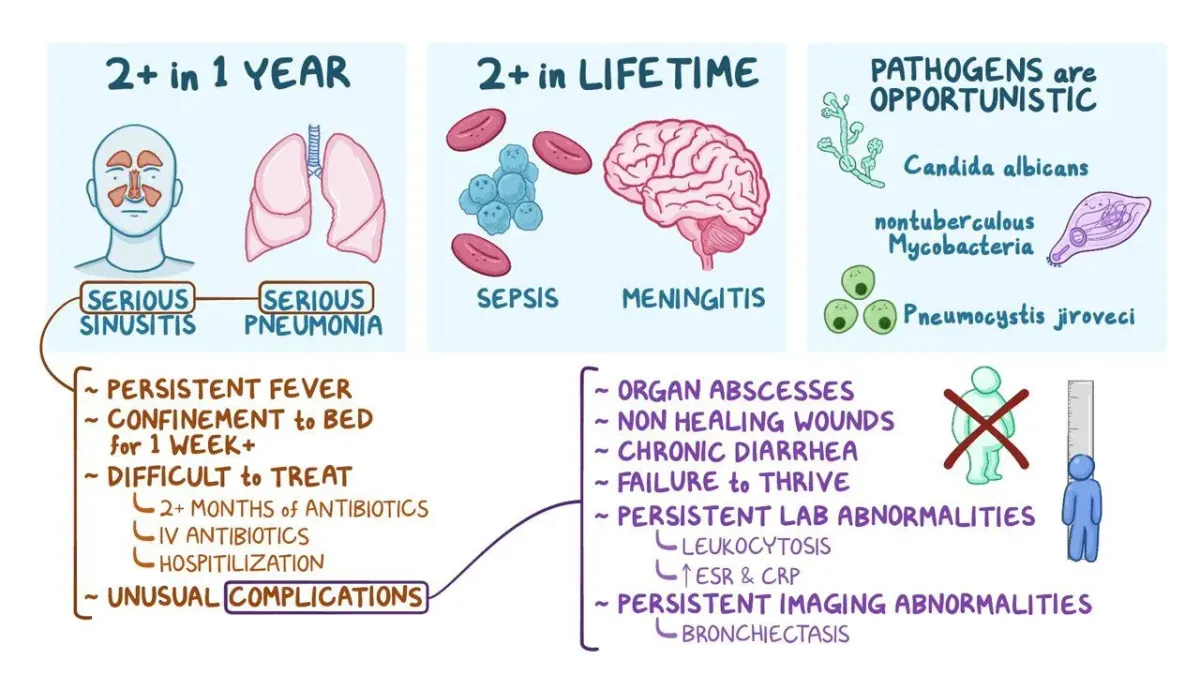Types of Immune Deficiency

Immune deficiency is a disorder that weakens a person's immune system. A baby's immune system is partly protected from infections by the mother's antibodies, and infants often show early signs of immunodeficiency, including recurrent infections and failure to thrive. Testing can be started if these symptoms occur during the early months of life, and the disorder can be diagnosed before it progresses. An initial laboratory screening should include a complete blood count with differential, measurement of serum immunoglobulin, and complement levels.
Leukocyte adhesion deficiency
Leukocyte adhesion deficiency (LAD) is a rare inherited immune deficiency in which immune cells cannot attach themselves to the blood vessel wall, thus preventing them from reaching the site of inflammation or tissue injury. Normally, neutrophils called phagocytes circulate in the blood and wait for a signal to enter the injured tissue. These cells respond to pro-inflammatory molecules and travel rapidly to the affected tissue. This process is known as extravasation.
Children with LAD are prone to recurrent bacterial infections. Infections are usually mild, but some can lead to serious and life-threatening complications. Symptoms of LAD include recurrent pneumonia, chronic middle ear infection, periodontitis, and localized skin infections. However, patients with successful allogeneic hematopoietic stem cell transplants may live well into their third decade.
IgA deficiency
A person with IgA deficiency has a lower than normal level of IgA. Although this deficiency is rare, it may be present in up to 20% of the population. The disease is usually asymptomatic. However, it can cause significant health problems. Fortunately, there are ways to detect it early and treat it successfully. A patient's blood can be tested for IgA levels.
Patients with IgA deficiency often develop infections in the respiratory tract. These are usually caused by bacteria such as Haemophilus influenzae or Streptococcus pneumoniae. Repeated infections can result in lung damage, such as bronchiectasis. In addition, patients may have to take antibiotics daily to prevent future infections.
Common variable immune deficiency
Common variable immune deficiency (CVID) is a group of primary immunodeficiencies characterized by hypogammaglobulinemia and poor or absent antibody responses to vaccination. Physicians in pediatrics, geriatrics, primary care, and internal medicine should be aware of this condition. Its incidence is estimated at 1:20,000 to 1:50,000 among Caucasians, with lower rates among Asians and Afro-Americans. Symptoms usually start between ages 15 and 40 years.
People with CVID usually have low levels of the immune protein IgG. Because of this, their body's immune system cannot fight off infections properly. This condition can also lead to unusual reactions to vaccines. As such, it is important to seek proper treatment to reduce the risk of developing this disease.
HIV
HIV deficiency affects the immune system, making an HIV-infected person susceptible to infections caused by bacteria, fungi, viruses, and malignancies. These infections can cause life-threatening illnesses, such as pneumonia and meningitis. In addition, individuals with HIV are also vulnerable to certain types of cancer. These cancers can progress to AIDS if they do not receive treatment for HIV.
HIV is a retrovirus that can be transmitted to other people through sex and sharing needles. It can also be transferred from mother to child during pregnancy, especially in low-income countries. HIV infects cells by inserting instructions into the DNA of infected cells. Anyone can get infected with HIV through any number of means, but the most common ways are sharing needles and sex without condoms. People who exchange sex for money or identify as gay is at particular risk.
Severe Combined Immunodeficiency
Severe combined immune deficiency is a rare genetic disorder that affects B and T lymphocytes, two types of white blood cells fighting infections. Because these cells are not functioning properly, people with SCID may have frequent, severe conditions. As a result, they are at a high risk of early death. Severe combined immune deficiency may be detected early through newborn screening.
This disease is characterized by a genetic defect and the failure of certain enzymes to produce antibodies to fight off infections. Doctors check for several genetic disorders in newborn screening programs, including severe combined immunodeficiency. The goal is to identify a child with SCID as early as possible. An early diagnosis leads to better treatment options and improved outcomes.



